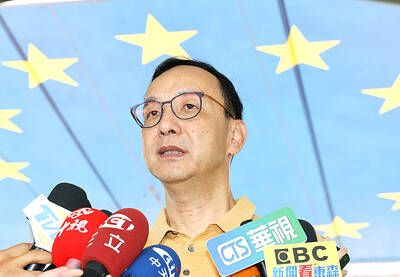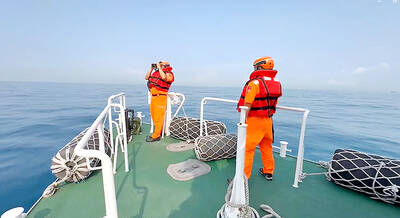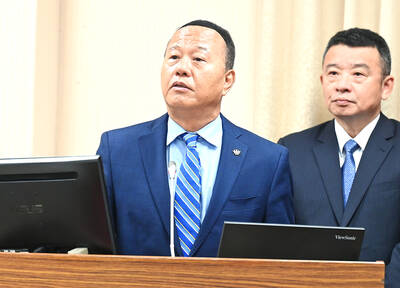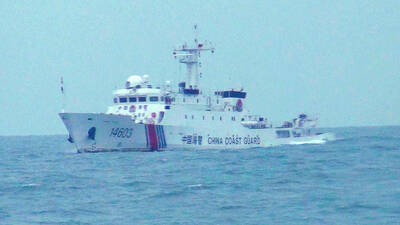About 13,000 hectares of farmland nationwide have been found to be occupied by 52,000 illegal factories, Council of Agriculture officials said on Sunday.
Premier Lin Chuan (林全) on Thursday announced that illegal factories built after May 20 last year are to be demolished, followed by illegal factories built before that date.
With the passing of the National Spatial Planning Act (國土計畫法) last year, the government has been preparing for a rezoning of the nation’s land into four categories — national reserves, marine resources, agriculture development and urban development areas.
A council survey found about 13,000 hectares of farmland have been appropriated by illegal factories, Department of Planning Director-General Tsai Sheng-fu (蔡昇甫) said.
An ad hoc committee has been formed by the council, the Ministry of the Interior, the Ministry of Economic Affairs, the Ministry of Justice and the Directorate-General of Budget and Accounting and Statistics to deal with the illegal factories.
Each factory claims about 0.25 hectares of land, Tsai said, adding that the council made the estimation based on satellite and aerial images compared with land registration records.
The economic ministry is to list the illegal factories, he added.
The first to be first demolished would be 109 illegal factories in Changhua County, which has the most of all municipalities, Tsai said, adding that the demolition work would be done by local governments.
Owners of illegal factories would have to pay for land restoration, but the fees would be calculated by other agencies, the council said.

GOOD DIPLOMACY: The KMT has maintained close contact with representative offices in Taiwan and had extended an invitation to Russia as well, the KMT said The Chinese Nationalist Party (KMT) would “appropriately handle” the fallout from an invitation it had extended to Russia’s representative to Taipei to attend its international banquet last month, KMT Chairman Eric Chu (朱立倫) said yesterday. US and EU representatives in Taiwan boycotted the event, and only later agreed to attend after the KMT rescinded its invitation to the Russian representative. The KMT has maintained long-term close contact with all representative offices and embassies in Taiwan, and had extended the invitation as a practice of good diplomacy, Chu said. “Some EU countries have expressed their opinions of Russia, and the KMT respects that,” he

An increase in Taiwanese boats using China-made automatic identification systems (AIS) could confuse coast guards patrolling waters off Taiwan’s southwest coast and become a loophole in the national security system, sources familiar with the matter said yesterday. Taiwan ADIZ, a Facebook page created by enthusiasts who monitor Chinese military activities in airspace and waters off Taiwan’s southwest coast, on Saturday identified what seemed to be a Chinese cargo container ship near Penghu County. The Coast Guard Administration went to the location after receiving the tip and found that it was a Taiwanese yacht, which had a Chinese AIS installed. Similar instances had also

VIGILANCE: The military is paying close attention to actions that might damage peace and stability in the region, the deputy minister of national defense said The People’s Republic of China (PRC) might consider initiating a hack on Taiwanese networks on May 20, the day of the inauguration ceremony of president-elect William Lai (賴清德), sources familiar with cross-strait issues said. While US Secretary of State Anthony Blinken’s statement of the US expectation “that all sides will conduct themselves with restraint and prudence in the period ahead” would prevent military actions by China, Beijing could still try to sabotage Taiwan’s inauguration ceremony, the source said. China might gain access to the video screens outside of the Presidential Office Building and display embarrassing messages from Beijing, such as congratulating Lai

Four China Coast Guard ships briefly sailed through prohibited waters near Kinmen County, Taipei said, urging Beijing to stop actions that endanger navigation safety. The Chinese ships entered waters south of Kinmen, 5km from the Chinese city of Xiamen, at about 3:30pm on Monday, the Coast Guard Administration said in a statement later the same day. The ships “sailed out of our prohibited and restricted waters” about an hour later, the agency said, urging Beijing to immediately stop “behavior that endangers navigation safety.” Ministry of National Defense spokesman Sun Li-fang (孫立方) yesterday told reporters that Taiwan would boost support to the Coast Guard